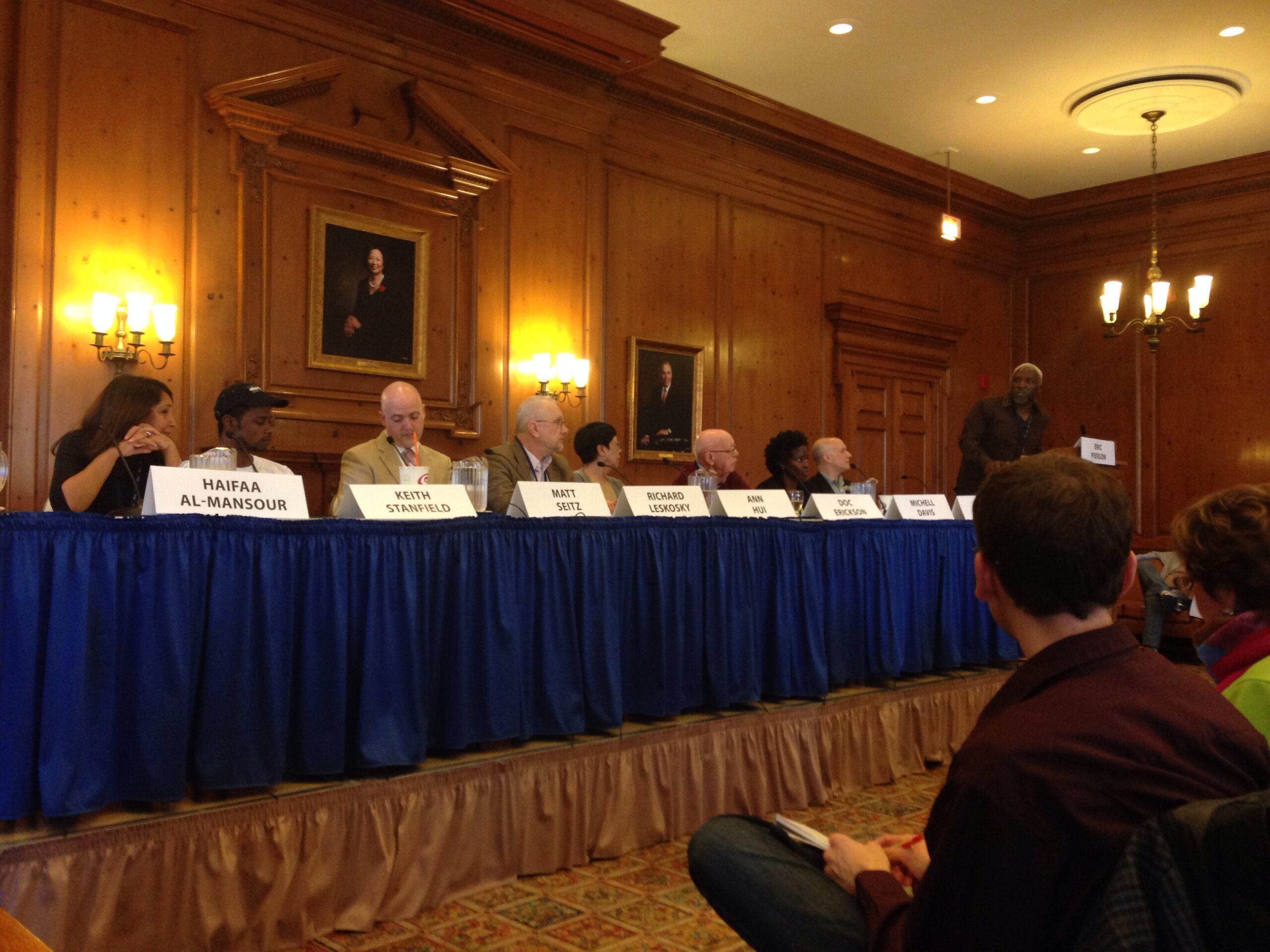Friday’s second Ebertfest panel was the sort of infectious talkathon relatively unbound by rigid structure. Though it succeeded in grappling with the discussion’s central topics, such as the inherently political nature of art, it also touched upon a variety of other issues, including the role that technology plays in our lives. “Short Term 12” star Keith Stanfield dubbed the Internet a “physical projection of consciousness itself,” while “Wadjda” director Haifaa
Al-Mansour said that it has created a virtual democracy in Saudi Arabia, allowing her courageous film, the first in her country directed by a woman, to reach a wide audience.
Moderator Eric Pierson, a veteran professor of Urbana-Champaign, opened the hour by quoting a line from Roger Ebert’s emotional review of Spike Lee‘s groundbreaking 1989 classic, “Do the
Right Thing,” which was set to have its 25th anniversary screening later that evening. Ebert wrote that the film led him to empathize with each of its characters, though he acknowledged the fact that many other viewers hadn’t thought the picture was as even-handed as he did. Fandor
founder Dan Aronson and RogerEbert.com editor-in-chief Matt Zoller Seitz discussed how the Internet has been able to increase the variety of views and interpretations available to readers, while contextualizing a given artwork through the use of videos and hyperlinks.
When teacher/critic Richard Leskosky voiced his belief in objective analysis, arguing that it wasn’t his job to further the argument of the filmmaker, Seitz countered with his opinion that
critics should never shy away from politics. He recalled his days at The Star-Ledger, where he had to find ways to criticize President Bush without ever blatantly articulating his views, likening his experience to that of Al-Mansour, who had to cloak her controversial feminist
messages in a digestible guise for conservative audiences. “Making a film, as a woman, is a political act,” Al-Mansour claimed, while Seitz said that every aesthetic choice in a cinematic work is fueled by political intentions. Mentioning his recent article in which he made a plea to his fellow colleagues to write about the filmmaking itself, rather than any issue left out of frame, Seitz singled out a key shot in Steve McQueen’s Best Picture Oscar-winner “12 Years a Slave,” where its imprisoned hero is framed behind the bars of his cell window as the
camera pans up to reveal a skyline highlighted by an unfinished capital dome. Thus, a statement is made without a word ever being uttered.
Doc Erickson, a longtime producer who served as an uncredited unit production manager on such Hitchcock classics as “Rear Window” and “Vertigo,” recalled how it was considered “very dangerous to make a thought-provoking film” in Hollywood. “A Simple Life” director Ann Hui said that while she is all for the democratization of films thanks to online platforms, it can lead to another kind of fascism ruled not by authority but by common vote. Looming over this discussion like a doom-laden shadow is the FCC’s upcoming May 15th ruling on “net neutrality,” first mentioned by director Jem Cohen in the post-screening Q&A of his film, “Museum Hours.” By allowing conglomerates to have faster-loading videos than those of indie artists, the law will ensure that, in the words of Seitz, “the people who have money will have a voice.” Michell Davis, an entertainment and intellectual property lawyer, brought valuable insight into the barbed promises of social networking sites to help market a movie for free.
Perhaps the biggest laugh occurred when the panel was asked, “Have audiences ever been way ahead of a film upon its initial release?” and Stanfield half-quipped, “Twilight.”
Pierson’s final question to the panel was to name a film that challenged them politically. Seitz’s choice initially seemed like an eyebrow-raiser, Tony Scott’s 1986 box office smash, “Top Gun.” Growing up in the post-Vietnam era, Seitz was disgusted when he observed American audiences loudly cheering the film’s white heroes as they blew faceless, vaguely Middle Eastern pilots out of the sky, causing him to reflect on how we, as a country, “had learned nothing.” The rest of the panel’s equally intriguing choices are as follows…
Al-Mansour: “Rosetta” (1999) by Jean-Pierre and Luc Dadenne
Stanfield: “Black Moon” (1975) by Louis Malle and “Malcolm X” (1992) by Spike Lee
Leskosky: “The Birth of a Nation” (1915) by D.W. Griffith
Hui: “Triumph of the Will” (1935) by Leni Riefenstahl and “Rhapsody in August” (1991) by Akira Kurosawa
Erickson: “The Man in the Gray Flannel Suit” (1956) by Nunnally Johnson
Davis: “Mahogany” (1975) by Berry Gordy, “The Rose” (1979) by Mark Rydell and the films of Bruce Lee
Aronson: Also “Triumph of the Will”
Pierson: “Network” (1976) by Sidney Lumet












